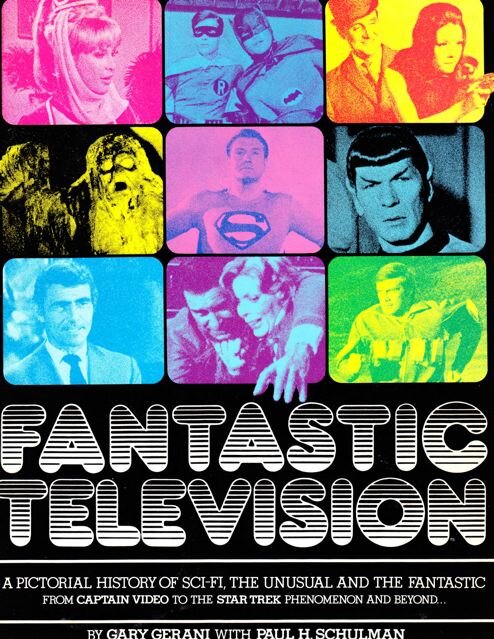You are hereNewspapers 1970-1979 / TV Trivia
TV Trivia
Television Treacle, Trivia, and Gossip
Astutely Analyzed
 Fantastic Television, by Gary Geranl with Paul H. Schulman <Harmony Books, 192 pp., Illus., $5.95).
Fantastic Television, by Gary Geranl with Paul H. Schulman <Harmony Books, 192 pp., Illus., $5.95).
Have you ever wondered how many episodes of Superman were made? Or how many partners John Steed had on The Avengers? Did you know that Cliff Robertson got his start In a TV series called Rod Brown of the Rocket Rangers? Or that Roald Dahl once hosted a show called Way Out? Have you ever wondered why pudgy Adam West was chosen to play Batman?
If not, then stop reading right here. If you have, however, then Gary Gerani and Paul Schulman's new book, Fantastic Television is just for you. In it, the authors index and describe every science fiction and fantasy TV series ever made, no matter how remotely connected to the genre, with shows ranging from standards like Star Trek and Outer Limits, to oddball things like Fireball X-L5 and Men Into Space.
The book is particularly fun for me as it should be for most of my generation, who grew up with the majority of the programs mentioned here. Where else, for example, could you be reminded that the stars of Supercar (a group of very energetic marionettes) were Mike Mercury, a stoical puppet, Dr. Beeker, "a brilliant, but wacky scientist, Mike's ward Jimmy, and Mitch, their pet monkey?"
Where else, too, could you find descriptions (like this one of a Batman incident) that properly catches the spirit of a show?: "the Caped Crusader casually strolls through a swinging discotheque, tells the maitre d', 'I shouldn't want to attract attention,' then stolidly orders a glass of orange juice at the bar." And where else could you find astute analyses of programs as different as Superman· and The Prisoner with comments like these?:
"In The Prisoner, the hero has 'vindicated the right of the individual to be an individual,' implying that if enough people assert their individuality, society won’tbecome a dehumanized, conformist mass. When Number Six asks who Number One is, the startling answer that he is Number One. He quit his intelligence post, therefore, for two reasons: first, to protest the repression fostered by the intelligence community as represented by ... the omnipresent bugs; and. second, to imprison himself, thereby demonstrating that each man'is his own warden, conforming to society's design only by his own com mands ... "
The answer is nowhere else, which makes Fantastic Television great fun to read: a work that effectively plays on nostalgia by refreshing many all but forgotten memories. Authors Gerani and Schulman are obviously fans themselves and have the right combination 'of detachment and involvement to make the behlnd-the-scenes descriptions and infront-of-the-screen analyses work.
The book is broken up into a number of parts. The first, "The Fine Tuning Section," features major s.f. programs which "were distinctive and memorable. Some were intelligent. some had incredible special effects, some were haunting or funny, and, of course, most were popular.” Here there are overall synopses and analyses of the series and their production and then chronological listings of every episode with production credits, cast lists, and TV Guide-like descriptions.
The briefer sections, “American Telefantasy” and “British Telefantasy” cover more tentative s.f. series and less Important offshoots (Bewitched, A for Andromeda) while "Kid Stuff" covers cartoon (Eighth Man, Astro Boy) and marionette shows (Planet Patrol, Supercar), and "Madefor-TV -Movies" covers just that.
All in all, Fantastic Television is the most comprehensive work of its kind that I've ever seen and is a tribute of sorts to the black and white images that were so much a part of my generation's youth. It's a monument to trivia, and as such is great nostalgia and great fun. Quick now, who did the Robot's voice on Lost in Space?
COLUMBIA DAILY SPECTATOR September 14, 1977
